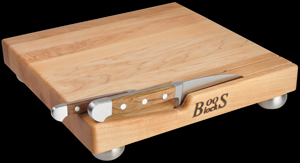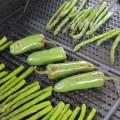 I’ve often been asked what is the best cutting board for a home kitchen. After selecting quality knives, which are the first high-cost purchase you need to make, cutting boards are probably the most important accessory for your kitchen. A good board makes slicing, dicing and chopping easier and safer.
I’ve often been asked what is the best cutting board for a home kitchen. After selecting quality knives, which are the first high-cost purchase you need to make, cutting boards are probably the most important accessory for your kitchen. A good board makes slicing, dicing and chopping easier and safer.
While there are numerous types of cutting boards: glass, ceramic, marble, wood, bamboo and plastic, I recommend only two types: wood and plastic. The other boards tend to dull knives very quickly.
I have two boards I use all the time– a Boos edge grain maple wooden board and a plastic board. The Boos board is large (24x18x2 1/4-inches) and handles a majority of my cutting needs while the plastic board is smaller (12x18x1/2-inch) and is used exclusively for handling raw chicken, fish and ground meats.
Plastic boards are readily available and inexpensive (about $20 or $25) but a quality wood board will be a significant investment. My Boos board weighs in at 27 pounds and has a retail price of $106 but it’s also a focal point of my home kitchen. Unfortunately, the health department doesn’t like wooden boards in professional kitchens.
The plastic board is small enough to fit in the dishwasher for easy cleaning and sanitation. The wooden board must be cleaned and then sanitized with a bleach solution (one teaspoon unscented bleach in one quart of water). After sanitizing a wooden board, it must be re-seasoned with USP-grade mineral oil. The board also needs to be seasoned prior to its first use with four to five coatings of mineral oil. Allow each coat to dry to 30 minutes before applying more oil. A new board should be oiled at least once a week for a month.
Lighter weight cutting boards have a tendency to slide across the counter top making cutting somewhat dangerous. To prevent this, place a damp side towel or a couple of damp paper towels under the board for traction.
Always use different boards when you’re switching from raw protein to vegetables to avoid the potential of cross-contamination.
Latest posts by Mike Stines (see all)
- Winter Shrimp Festival: Comfort of the Sea - 11/11/2022
- Singapore Fried Prawns with Dried Chile - 10/31/2022
- Planked Trout with Cayenne and Herbs - 08/02/2022







